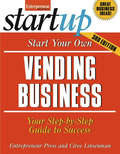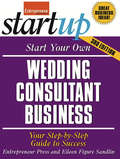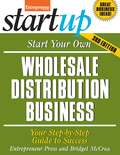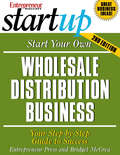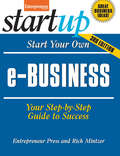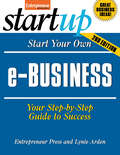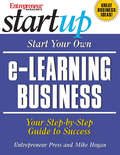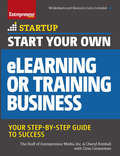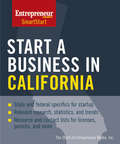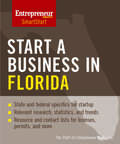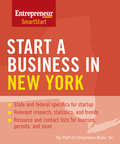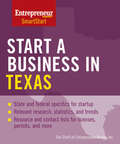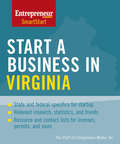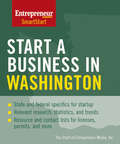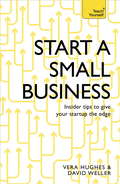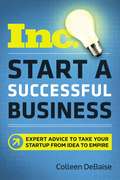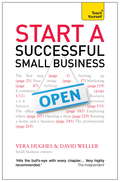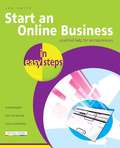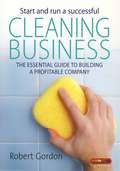- Table View
- List View
Start Your Own Vending Business
by Entrepreneur PressTurn Small Change Into Big Profits!Looking for an opportunity to make big profits while setting your own schedule? A vending business could be your ticket to the top. Americans feed vending machines more than $46 billion a year for sodas, candy, coffee and other snacks. That's a nice chunk of change you could be pocketing.Starting is easy. You can begin part time out of your home. As your customer base increases, you can hire extra help, invest in more machines and expand your service area. There's no limit to how large your business can grow.Get the inside scoop on how to start up in this lucrative, flexible business. Expert advice covers:How to select the hottest new products for vending machinesThe best ways to finance your new businessThe secrets to scouting out territories and establishing routesWhere to find supplies at a discountThe latest statistics, trends and forecasts from industry expertsCritical tips to avoid getting scammedNew technology and the use of social mediaChecklists, work sheets and expert tips guide you through every phase of the startup process. With low startup costs and no experience required, a vending business is a perfect choice for your new venture.
Start Your Own Wedding Consultant Business
by Entrepreneur PressSay "I Do" to Success From wedding bells to wedding bills, gain an inside look at the billion dollar wedding industry and learn how to earn your next pay check coordinating the "big" day of today's brides and grooms.Discover the newest wedding trends, such as destination weddings, tapas-style catering, disposable video cameras, wedding logos and more. Plus, learn everything else you need to know to start and run a successful wedding consultant business, including:How to market your services and find customersUsing social media to attract and communicate with clientsTips from the pros for handling the unexpectedWhat licenses and permits you needHow to avoid common mistakesHow to negotiate with vendors and suppliers to get the best pricesThe most important contacts to makeAnd more!You don't need an office or a lot of startup money. With your creativity and help from our experts, you'll be well on your way to success!
Start Your Own Wholesale Distribution Business
by Bridget Mccrea Entrepreneur PressLike making deals and money but don't care for the daily grind?Then consider becoming a middleman--the wholesaler--who buys goods from the manufacturer and sells them to retailers for a profit.With millions of products on the market already and new ones coming every day, the wholesale economy has plenty of room for growth. This easy-to-read guide covers locating manufacturers and retailers, securing product exclusives, and identifying prime locations for wholesale distributorship. With insider secrets for beating the competition and step-by-step instruction on how to start making money today, this fully revised third edition also covers he Internet's growing role in distribution, effective strategies for dealing with shrinking profit margins, and specific product lines to focus on for maximum success.
Start Your Own Wholesale Distribution Business
by Entrepreneur PressYou like doing deals and making money but don't care much for the retail grind? You should be the middleman-the wholesaler-the one who buys goods in volume from manufacturers and sells them to retailers at a profit. With millions of products on the market already and new ones coming every day, the wholesale economy has plenty of room for growth. This guide reveals how to start a thriving wholesale operation, specializing in any industry you choose-and run it from your kitchen table, if you'd like. You'll learn: How to make contact with manufacturers and retailers Which product lines will bring maximum success Insider secrets for overcoming the competition How to take advantage of the internet's growing role in distribution Effective strategies for increasing profit margins You'll also get sample forms, step-by-step instructions, checklists and worksheets to guide you smoothly through each stage of the startup process. It's a straight shot from where you are today to owning and running your own business-and you can start right now.
Start Your Own e-Business
by Rich Mintzer Entrepreneur MagazineWith retail e-commerce sales topping $263.3 billion in 2013,and millions of people now flourishing as internet entrepreneurs, the web is the place for new businesses to be. This guide makes tapping into highly lucrative markets with an easy-to-start, inexpensive internet business easier than ever. Readers can use the successful strategies and extensive step-by-step process outlined in this book to turn their dream of entrepreneurship into a lucrative, online reality. With information on everything from choosing a domain and building a site to search engine optimization and cashing in on affiliate programs, this indispensable guide will become every "netpreneur's" business-building bible.
Start Your Own e-Business
by Entrepreneur PressToday's internet offers a virtual world of opportunity! New turnkey technologies and tools make it easier than ever to start a profitable online business-if you take the right steps. Let the experts at Entrepreneur show you how to skillfully navigate the web and turn your business dream into an online reality! Taking you through funding, building partnerships, launching, capturing customers and more, our experts lead you step by step. Discover how to use the latest technology solutions and keep your business on the cutting-edge! Plus, gain a comprehensive understanding of today's e-business world from top online entrepreneurs, in-the-trenches examples and advice, and included resources. Learn how to: Build an effective website using fast, turnkey solutions Gain exposure using the latest online techniques including search engine listings, creating "cyber-bait" and more Cash in on affiliate programs Use low-cost, high-impact marketing to drive traffic and capture customers Keep your site running smoothly with surefire online tools And more
Start Your Own e-Learning Business
by Entrepreneur PressIn the Information Age, the personal computer is becoming as pervasive as the telephone and television. It accesses vast stores of constantly changing information and the ability to navigate it and the Internet has become a professional necessity for a majority of white and blue collar jobs. And the key to opening that doorway is computer-based learning-"e-learning." Using computers for education and training, an industry that barely existed a decade ago, is a fast-growing business opportunity for enterprising people who enjoy helping others learn and who are comfortable with computers. Start Your Own e-Learning Business shows you how to become the person people turn to when they need to catch up on essential skills and knowledge. This guide covers the vast selection of roles you can choose from, including: Teaching businesses computer basics, management techniques, or programming skills Publishing guides to help employees understand their firm's software Producing interactive content that explains products to customers Creating Web sites to help students do their homework or seniors hone their Internet skills Providing content, marketing help, or tech services for other e-learning firms Brokering classes, recruiting students, or reselling CD-based courses for other businesses
Start Your Own eLearning or Training Business
by The Staff of Entrepreneur Media Ciree LinsenmannPossibly credited to advancements in technology or learning behaviors, or a rise in focus on personal development, the education and training industry is steadily growing, creating a demand for eager entrepreneurs. Exploring varied opportunities aspiring business owners will be given business ideas, teaching and training methods, and an overview of essential tools. A range of industry examples will be given for: Accreditation, certifications, and credit Adding training onto an existing business as side income How to sell media/training tools How much to charge clients Start up costs Software types used The legal obligations around taxes, business registration, working from home, and content confidentiality Growth planning and writing a business planRelevant and fun call-outs, tip boxes, industry stats, an index, and a rich appendix and glossary will be provided. Appendix will offer resources in: Continued learning and rounded training for trainers Industry organizations and trade groups Books and eBooks Videos Software Websites Successful online trainers and online education institutions Consultants Certification organizationsTeaching methods and tools will cover: Videos eBooks Interactive software types College sponsored staff training for college instructors Hardware, camera, video, sound equipment Online group forums Online events Choosing the right presentation style and linking to appropriate social media sites Networking presentations
Start a Business for Less Than $15,000
by Richard WalshMillions of Americans are out of work. Their savings accounts have shrunk, and they're taking out second mortgages and cashing in their retirement accounts to pay off overdue credit card bills. But the entrepreneurial spirit is alive and well in America, as clear in initiatives like Small Business Saturday and Entrepreneur.com. And hundreds of thousands of courageous innovators have decided to start their own businesses. The question is--how much money will it take to do it successfully? Here are innovative, exciting ideas for businesses based on what the reader can afford. For each venture author Richard Walsh outlines start up expenses, probable earnings, qualifications, and gives the low down on what the business is really all about. This is the essential down-and-dirty guide for every aspiring entrepreneur who wants to select a business, get a business plan together, and join the small business revolution.
Start a Business for Less Than $15,000: From Advertising Agency to Workers' Compensation Consultant, 125+ Profitable Business Startups for Under $15,000 (Start a Business)
by Richard WalshMillions of Americans are out of work. Their savings accounts have shrunk, and they’re taking out second mortgages and cashing in their retirement accounts to pay off overdue credit card bills. But the entrepreneurial spirit is alive and well in America, as clear in initiatives like Small Business Saturday and Entrepreneur.com. And hundreds of thousands of courageous innovators have decided to start their own businesses. The question is—how much money will it take to do it successfully? Here are innovative, exciting ideas for businesses based on what the reader can afford. For each venture author Richard Walsh outlines start up expenses, probable earnings, qualifications, and gives the low down on what the business is really all about. This is the essential down-and-dirty guide for every aspiring entrepreneur who wants to select a business, get a business plan together, and join the small business revolution.
Start a Business for Less Than $2,000: From Airbrush Artist to Wellness Instructor, 75+ Profitable Business Startups for Under $2,000 (Start a Business)
by Richard WalshMillions of Americans are out of work. Their savings accounts have shrunk, and they’re taking out second mortgages and cashing in their retirement accounts to pay off overdue credit card bills. But the entrepreneurial spirit is alive and well in America, as clear in initiatives like Small Business Saturday and Entrepreneur.com. And hundreds of thousands of courageous innovators have decided to start their own businesses. The question is—how much money will it take to do it successfully? Here are innovative, exciting ideas for businesses based on what the reader can afford. For each venture author Richard Walsh outlines start up expenses, probable earnings, qualifications, and gives the low down on what the business is really all about. This is the essential down-and-dirty guide for every aspiring entrepreneur who wants to select a business, get a business plan together, and join the small business revolution.
Start a Business for Less Than $5,000: From Accountant to Window-Washing Service, 125+ Profitable Business Startups for Under $5,000 (Start a Business)
by Richard WalshMillions of Americans are out of work. Their savings accounts have shrunk, and they’re taking out second mortgages and cashing in their retirement accounts to pay off overdue credit card bills. But the entrepreneurial spirit is alive and well in America, as clear in initiatives like Small Business Saturday and Entrepreneur.com. And hundreds of thousands of courageous innovators have decided to start their own businesses. The question is—how much money will it take to do it successfully? Here are innovative, exciting ideas for businesses based on what the reader can afford. For each venture author Richard Walsh outlines start up expenses, probable earnings, qualifications, and gives the low down on what the business is really all about. This is the essential down-and-dirty guide for every aspiring entrepreneur who wants to select a business, get a business plan together, and join the small business revolution.
Start a Business in California
by The Staff of Entrepreneur MediaThis state-specific title in Entrepreneur's evergreen SmartStart series shows the reader how to start a business in California. The staff of Entrepreneur Media presents essential guidance to aspiring business owners including state-specific rules, regulations, contacts, and statistics. Includes updated forms, worksheets, and tax information.
Start a Business in Florida
by The Staff of Entrepreneur MediaThis state-specific title in Entrepreneur's evergreen SmartStart series shows the reader how to start a business in Florida. The staff of Entrepreneur Media presents essential guidance to aspiring business owners including state-specific rules, regulations, contacts, and statistics. Includes updated forms, worksheets, and tax information.
Start a Business in New York
by The Staff of Entrepreneur MediaThis state-specific title in Entrepreneur's evergreen SmartStart series shows the reader how to start a business in New York. The staff of Entrepreneur Media presents essential guidance to aspiring business owners including state-specific rules, regulations, contacts, and statistics. Includes updated forms, worksheets, and tax information.
Start a Business in Texas
by The Staff of Entrepreneur MediaThis state-specific title in Entrepreneur's evergreen SmartStart series shows the reader how to start a business in Texas. The staff of Entrepreneur Media presents essential guidance to aspiring business owners including state-specific rules, regulations, contacts, and statistics. Includes updated forms, worksheets, and tax information.
Start a Business in Virginia
by The Staff of Entrepreneur MediaThis state-specific title in Entrepreneur's evergreen SmartStart series shows the reader how to start a business in Virginia. The staff of Entrepreneur Media presents essential guidance to aspiring business owners including state-specific rules, regulations, contacts, and statistics. Includes updated forms, worksheets, and tax information.
Start a Business in Washington
by The Staff of Entrepreneur MediaThis state-specific title in Entrepreneur's evergreen SmartStart series shows the reader how to start a business in Washington. The staff of Entrepreneur Media presents essential guidance to aspiring business owners including state-specific rules, regulations, contacts, and statistics. Includes updated forms, worksheets, and tax information.
Start a Small Business: The complete guide to starting a business
by Vera Hughes David Weller'Hits the bull's-eye with every chapter... Very highly recommended.' - The Independent This is a fully updated new edition of the bestselling guide for anyone who is thinking of starting their own business. It covers both the strategic and practical issues in the ideal level of detail for budding entrepreneurs, and is full of insider tips which will help give your business the edge in a tough marketplace.
Start a Small Business: The complete guide to starting a business
by Vera Hughes David Weller'Hits the bull's-eye with every chapter... Very highly recommended.' - The IndependentThis is a fully updated new edition of the bestselling guide for anyone who is thinking of starting their own business. It covers both the strategic and practical issues in the ideal level of detail for budding entrepreneurs, and is full of insider tips which will help give your business the edge in a tough marketplace.
Start a Successful Business (Inc.) (Inc.) (Inc.) (Inc.) (Inc.) (Inc.) (Inc.) (Inc.): Expert Advice to Take Your Startup from Idea to Empire
by Colleen DeBaiseLet Inc. help launch your dreams.Makers, doers, and dreamers — for decades they have turned to Inc. for help in getting their businesses off the ground. The publication’s keen advice clarifies the process, while startup stories fuel aspirations and spark action.Warby Parker shook up the eyewear sector with its innovative, socially-conscious business model. Skullcandy tapped into the surfing, skateboarding, and hip-hop scenes — and built a standout audio brand. All along, Inc. was there, capturing triumphs, setbacks, and lessons learned.Now, Start a Successful Business gathers these important lessons into a single path-charting guide. From brainstorming to crowdfunding to building partnerships, the book walks new and aspiring founders through seven crucial stages:Come up with a brilliant business ideaSelect the best structure and strategy for your startupFigure out fundingGet the word out — and get customersDig deep to discover their wants and needsBecome an exceptional leaderPrepare to go globalThroughout, celebrated entrepreneurs share ideas that worked for them, including where Sarah Blakely got the inspiration for Spanx, how Elon Musk stays insanely productive, why Rent the Runway ditched the business plan, and how a hashtag accelerated Airbnb’s success.With a fleet of trusted experts by your side, starting a business will be faster, less confusing — and a whole lot more fun.
Start a Successful Small Business: Teach Yourself
by Vera Hughes David Weller'Hits the bull's-eye with every chapter... Very highly recommended.' - The IndependentThis is a fully updated new edition of the bestselling guide for anyone who is thinking of starting their own business. It covers both the strategic and practical issues in the ideal level of detail for budding entrepreneurs, and is full of insider tips which will help give your business the edge in a tough marketplace.
Start a Successful Small Business: The complete guide to starting a business
by Vera Hughes David Weller'Hits the bull's-eye with every chapter... Very highly recommended.' - The IndependentThis is a fully updated new edition of the bestselling guide for anyone who is thinking of starting their own business. It covers both the strategic and practical issues in the ideal level of detail for budding entrepreneurs, and is full of insider tips which will help give your business the edge in a tough marketplace.
Start an Online Business in Easy Steps
by Jon SmithStart an Online Business in Easy Steps is an invaluable business guide as well as a practical guide to creating a successful online business.It starts by asking the reader to clearly think through why he/she wants to start a business; whether an online business is the right approach for the business and who the business is aimed at. It even suggests ways of raising finance for starting the business.Then, the guide covers the practical aspects: setting up the website, getting a domain name, e-commerce, and accounting and running the online business. It explains how to manage website as well as the supply chain for both types of businesses, where the reader is supplying physical products or where he/she is selling downloadable digitized products and subscriptions.Finally, the author uses his invaluable experience to guide the reader through marketing the business and online customer relations. He uses his insight to enlighten the reader to consider different revenue streams such as partnering with other websites as well as earning advertising revenue.A practical guide to inspire entrepreneurs!
Start and Run A Successful Cleaning Business: The essential guide to building a profitable company
by Robert GordonThe cleaning industry is worth billions each year. There is plenty of money to be made, and you don't require any specific qualifications to get started. What you do need is a range of key skills, and a personal determination to succeed.This book will give you insider knowledge of the world of office and domestic cleaning. It will provide you with all the practical tools you need to succeed in a competitive but rewarding industry.- The basics required to set up your business and the services you can offer.- How to develop sales, and how to find - and keep - satisfied clients.- How to find good staff, train them, and deal with problems.- How to maintain the quality of your service provision as you grow.- Managing the legal, health & safety, and insurance requirements.- How to develop your brand and grow your company.- Book keeping, debt control and finance- How to develop further lucrative services to offer your client base.
